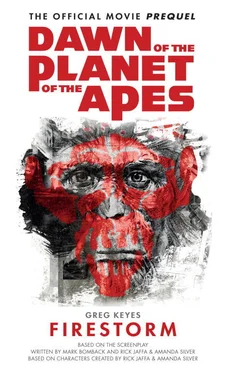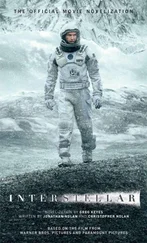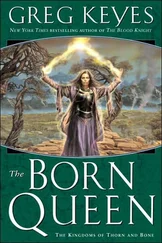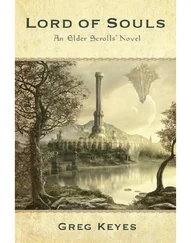He took another drink. It had been a while since he had whisky. It felt good in his belly.
“Very well,” he said. “If you wish.”
“I wish.”
“I was twelve, as I said,” Malakai began. “I was coming out of the hills.” He smiled. “No bushmeat, this time. My uncle had acquired a few cows, and I was bringing them down from foraging. We had food to eat, every day. My mother made this thing, you know, that everybody made— bugari . It’s just a sort of paste made from cassava or cornmeal. You roll up a ball of it and then you poke a hole, so it is like a little shot glass. And then you dip it in the stew. My mother made the best stew. In poor times, there was not much in it—a few ground peanuts, some hot chilies, coconut, maybe some caterpillars…”
He paused for a reaction from Clancy, but what he got wasn’t what he was expecting.
“Gorilla,” she added. “Chimpanzee.”
“Ah,” he said. “No. The gorilla meat we usually sold. More often than not my uncle would be asked to obtain some by a local official or rich man who would loan him a gun. Once we got to keep the head, but you don’t make stew from that, you—”
“No,” she said. “That’s enough. How could you eat something so close to a human being?”
“As a matter of fact, my mother would not eat chimp, for that very reason. But others ate it. You forget, I think, that even human meat has been on the menu in many places and times. Indeed, some people I knew just around that time were eaten by Rega warriors.”
“Right,” she sighed. “I just… Okay, go ahead. Your mom made great stew.”
“The best, but it was better if she had some meat, and that day I knew there was going to be chicken in it, and I was already imagining the taste, eager for it.” He closed his eyes. “I can still remember the taste.
“You see, we not only had the cattle, my mother and sister had found sewing jobs. There was a lot of excitement in the air, too, that year—our country had become independent just a few years before. There was a lot of turmoil, but to us it seemed far away. We were a small village, of no interest to anyone.
“My buddy Jean-Francis was with me. He was a year older, I think, a smart boy. He was Hutu and my mother was Nyanga, but that wasn’t such a big deal back then.”
“What about your father?” Clancy asked.
“Ah, my father,” Malakai said. “Well, you know, I never knew him. He was an American, you see, an anthropologist. He came to the Congo to study the natives, and I guess he did. He studied my mother, anyway. Then he left.”
“I’m sorry.” “It is nothing,” he said. “He was never there, so how could I miss him? And my uncle was there, my mother’s brother. He raised me as well as any father.”
“I didn’t mean to interrupt.”
He shrugged. “So we’re coming back with the cows, and I’m dreaming of chicken stew with bugari , and we hear these sounds. At first we think we’ve missed a festival of some sort, and we hurry to get closer. But when we realize what we’re hearing, we slow down.
“We are hearing gunshots, and people screaming. The people in our village. We leave the cows and creep down closer, to where the trees come up to the fence. And then we see, you know? There are men with guns, killing everyone. Everything that moves. I see little Marie, she’s five years old. She’s just staring at them, no idea what is going on, and then a bullet hits her, and she’s gone like a broken light bulb.”
“Why?” Clancy asked, her eyes wide. “Why would they do that?”
“At the time I didn’t know. There was a rebellion in my part of the country, by a group called Simba. The leaders were communists, but they attracted a lot of tribal leaders and people who didn’t like what was going on in our new country. It was, as you say, complicated. It made countries like the United States very nervous. Nervous enough to put their support behind pretty much any leader who was not a communist. The men I saw that day were mercenaries. Most were white men from South Africa and Rhodesia, but some were from Europe and America. They were under orders to take no prisoners, to kill everyone, to set an example so that no other village would give aid to Simba.”
“Did your village give them aid?’ she asked.
“I don’t know,” he replied. “Maybe. After it was over, there was no one to ask.”
He paused to give her time to ask another one of her endless questions, but she was silent.
“Anyway,” he said. “Jean-Francis sees his little brother, and he can’t stop himself, he jumps over the fence and runs toward the men. They do not see him until he’s on one of them. But Jean doesn’t know much about fighting, and the mercenary does, and he clubs poor Jean to death with the butt of his rifle. Me, I run when I see this, I run until I remember my mother and my sister are down there, and then I start to go back.
“Our house was a little outside the village, so I was hoping they would be okay. They weren’t—they… Well I told you already. My mother was already dead, but they weren’t finished with my sister yet. When I saw it, I went mad. There were three of them. I was just running at them, screaming, but they knocked me down, and one held me and made me watch. And then they were going to kill me.”
“What happened?”
“What happened is my uncle comes out of nowhere with his machete and kills the one who is holding a gun. The other two didn’t have a chance. I remember…”
He stopped.
“It’s okay,” Clancy said. “You don’t have to.”
He shook his head. “I remember I could smell the bugari scorching, and thinking how it would ruin the whole meal,” he said. “That’s what I remember going through my mind. Anyway, then my uncle grabs me and we run away, up into the hills, where we can hide. We hide in the jungle for more than a week. Hiding like these apes, here, now that I think of it. But we couldn’t climb so well.” He looked at Clancy. “Could you spare another drink of that?”
“Of course,” she said, pouring him another shot.
He took a long swallow, wondering again why he was telling her any of this. But there was something about being here, about the trees, the mist, the men with guns, that was making it swell up in him, that forced him to put it into words.
“What did you do after?”
“We joined Simba,” he said.
“You were twelve!”
“Many men are soldiers by that age,” he said. “On both sides. Many still are. In my group in particular, there were many boys, and girls, too, some younger than me. We were baptized, and shamans chanted, and the shamans told us we were invulnerable to bullets. They gave us marijuana to get us high. We stayed stoned most of the time, which was probably for the best because they armed us only with traditional weapons: spears, clubs, bow and arrow. Although our leaders usually had guns.”
“Oh, my God.”
“I don’t think God had much to do with any of it,” he said. “My first battle—if you want to call it that—was in this little town, not much bigger than the one I was born in. We had rounded up every man, woman, and child that might be ‘westernized.’ Police, public officials, anyone that was white, of course—anyone who knew how to read or write French. Then we executed them with spears, machetes, clubs, and what have you. We wiped out whole villages, just as they did. I was so stoned I barely remember any of it.”
That part was a lie. He remembered the first man he had ever killed. He was a young schoolteacher whose crime was teaching western ideas. He begged for his life, but all Malakai could think of was his mother and his sister and the burnt bugari . The marijuana made everything unreal; the machete in his hand felt like a magic stick as it made pieces of the teacher, and as he did it he remembered butchering gorillas. It was very much the same.
Читать дальше












